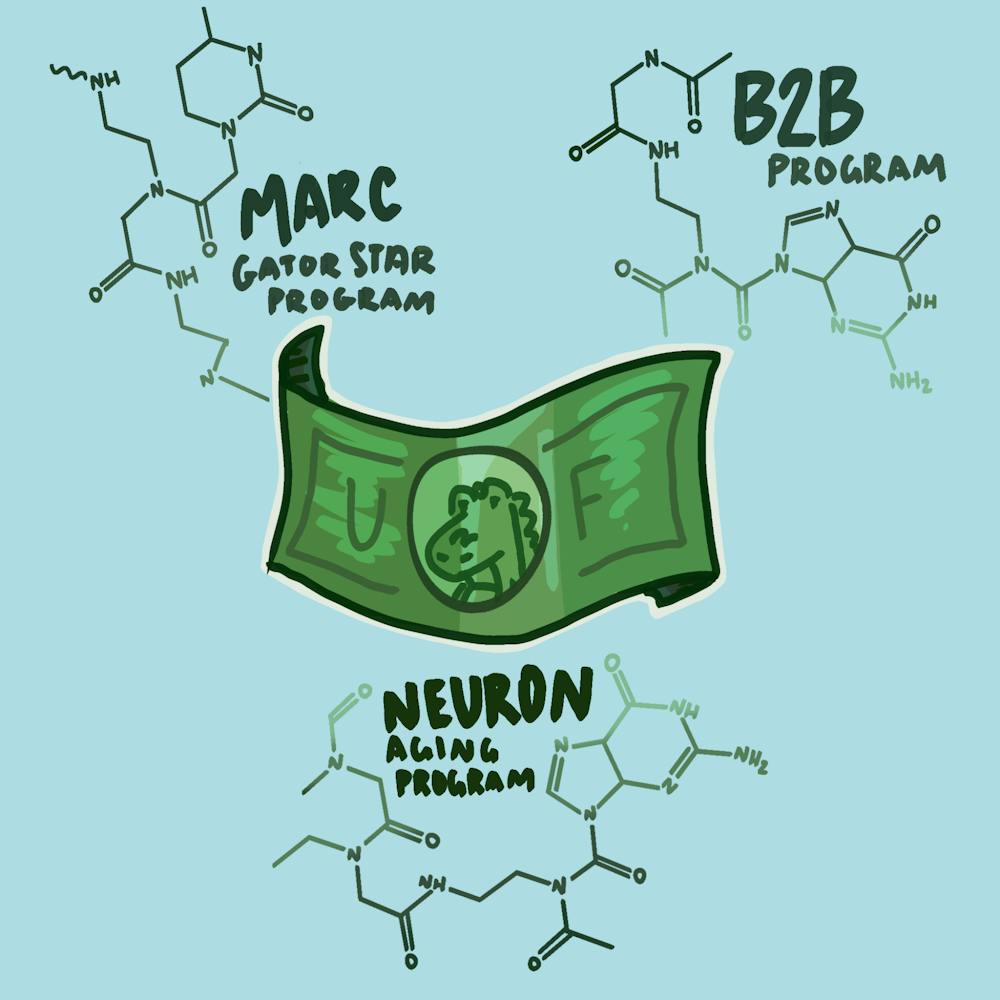Read more from The Alligator's "Ripple Effects" special section here.
As UF research spending hit an all-time high, undergraduate funding across the country fell into turmoil when the National Institute of Health abruptly terminated research grants. Some of UF’s undergraduate programs were swept into the mix.
Three UF programs received NIH funding to conduct biomedical research, with a focus on helping students with socioeconomic disadvantages. The grant terminations left each program’s future in question as they looked for alternative support.
In January, President Donald Trump issued an executive order to halt funding and support for programs advancing DEI initiatives. The following month, the NIH began terminating research grants, specifically those appearing to fund DEI-related research.
“Our program was compliant with Florida laws, so any mentions of DEI had already been written out,” said Elizabeth Molchan, a 23-year-old UF alumnus who joined the Maximizing Access to Research Careers program in 2023. “It felt even more unfair for us to receive the termination.”
Opponents contested the cuts in ongoing court cases, saying they violated federal laws having to do with administrative agencies’ power.
At UF, the cut grants include the MARC GatorSTAR program, which supports students “with disabilities or from disadvantaged backgrounds” in pursuing a biomedical PhD. Similarly, the SF2UF Bridge to Baccalaureate program supports low-income, first-generation Santa Fe College students in their transfer to UF.
Both programs submitted proposals for new NIH grants every five years.
Prior to NIH’s funding changes, the programs submitted proposals focused on disadvantaged students — those who had a disability, or who identified as a racial or ethnic minority with a socioeconomic disadvantage, said David Julian, the program director for MARC and SF2UF.
Both programs altered their proposals to comply with Florida’s 2023 DEI standards. Nonetheless, the programs were still “swept in” with other terminations across the U.S., Julian said.
Research shows a team of diverse individuals is more likely to successfully solve a complex problem, because its members offer more perspectives, Julian said. He added students who are low-income, first-generation or have disabilities experience increased difficulties getting into top graduate programs.
However, as a tax-funded organization, the NIH has the right to change its priorities, Julian said.
“We just try to respond to that and try to be as effective as we can, help as many students as we can, given the limits and parameters set by NIH,” Julian said.
The MARC program’s grant remains terminated indefinitely, he said. SF2UF’s grant was reinstated until July 31, 2026, but it's unclear if funding will continue afterward.
The third undergraduate program to lose funding, the NEURON-Aging program, supports students at different education levels in studying aging in neurobiology, like Alzheimer’s disease. The program began in 2023 under a NIH grant meant to promote programs expressing biomedical interest. The grant was only active for two years. The program’s director did not respond in time for publication.
Student frustration
Molchan, who worked in the MARC program from 2023 until she graduated in Spring 2025, said the program aimed to make science more open to everybody. Its grant termination felt like “a stab in the back.”
“For a lot of my fellows who … promises and agreements were made to,” Molchan said. “All of a sudden, the rug is being yanked out from under them.”
Molchan said she learned about the MARC program from her lead researcher, who recommended it to her because she was a woman coming from an underrepresented background.
Corey Broersma, a 21-year-old UF alumnus, joined the NEURON-Aging program in Spring 2023.
When the DEI-related executive order passed in January, Broersma said members of the program anticipated “something was probably going to happen” with their grant.
In April, Broersma’s mentor confirmed it would be terminated, Broersma recalled.
Following their graduation, Broersma sought additional research opportunities and applied to post-baccalaureate programs across the U.S. But those programs were canceled after the NIH terminated their funds, too.
“That really put a wrench in my plans,” Broersma said. “All of the programs that I had applied to were gone suddenly.”
Tatiana Copja, a 21-year-old UF biology and cognitive and behavioral neuroscience senior, said it was “disheartening” to hear the NEURON-Aging grant was terminated.
News of the termination caused turmoil, Copja said, as trainees speculated on what would happen to their labs.
After the termination, NEURON-Aging members began petitioning to attempt to appeal the act, Copja said, and she heard the petitions were rejected.
Felipe Quintana, a 21-year-old UF marine science senior, became a SF2UF fellow in Summer 2023. The grant terminations are a “shame,” he said, and impact many students in the program, especially those who are from out-of-state.
Some fellows needed additional financial support once the grant was terminated and “had to immediately start looking for work,” Quintana said.
NIH grant funding provided fellows in both MARC and SF2UF with opportunities to attend scientific conferences, which provided research experience and networking opportunities, Quintana said.
“We got to network with so many amazing scientists, and it’s really unfortunate that we won’t be able to offer that anymore,” Quintana said. “I think that’s going to be the biggest detriment to me and to future generations.”
Melissa Fraga, a 20-year-old UF nutritional science senior, joined the MARC program for an opportunity to conduct research while retrieving financial support. Once the grant was terminated, she decided she had to part ways with the program.
“The money that pays for rent, you wondered ‘Am I going to get it?’” Fraga said. “It was a very stressful time.”
Contact Leona Masangkay at lmasangkay@alligator.org. Follow them on X @leo_amasangkay.

Leona is a second-year journalism student and the Fall 2025 Santa Fe College reporter. They previously worked on the audience and growth team over the summer as a social media strategist. In their free time, Leona enjoys going to the gym, listening to music and watching Marvel movies.






